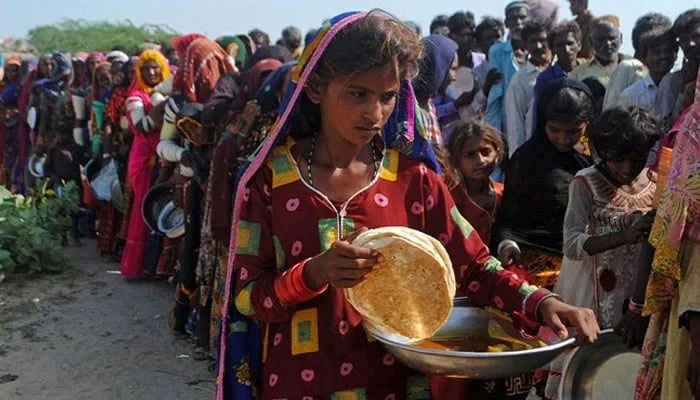Strategic philanthropy crucial for Pakistan’s social progress
Islamabad:Experts at a policy dialogue have called for a shift towards strategic philanthropy in Pakistan, emphasising the need to align funding with local needs, promote financial literacy for women in rural areas, and foster collaboration across sectors.
Highlighting Pakistan's strong charitable tradition, the experts urged data-driven approaches to tackle issues such as gender inequality, climate adaptation and skill development, aiming for sustainable and inclusive growth.
The experts advocated smarter financial models and greater cooperation with government and private sectors to uplift vulnerable communities and address the country’s pressing development challenges.
They made these remarks during a high-level policy dialogue hosted by the Sustainable Development Policy Institute (SDPI), titled ‘Collaborative Philanthropy in Pakistan with a Gender Lens’.
Chief Engagement Officer of the Asian Venture Philanthropy Network (AVPN) Tristan Ace noted that Pakistan was one of Asia’s newer markets for us. “We are seeing a shift towards more strategic philanthropic approaches, with a growing focus on collaboration to address pressing social issues,” Mr Ace said.
He highlighted that in an increasingly multi-polar world, strategic philanthropy was critical, especially as nations grapple with climate adaptation and persistent social inequalities. He said we must invest in long-term solutions and work closely with governments to tackle entrenched problems.
Care Foundation Chairperson Seema Aziz stressed that literacy alone was insufficient and education must now be seen as a societal equaliser. She advocated for a minimum of 12 years of education for all Pakistani children, with a focus on the underprivileged.
Ms Aziz emphasised that despite significant financial resources in Pakistan, literacy rates remained dismal. “We must spend funds based on community needs, as this yields the best results,” she added.
Meanwhile, Shaheen Attique, founder of the Bunyad Foundation, drew attention to Pakistan’s illiteracy rates, noting that the nation leads globally in terms of the number of illiterate individuals.
“Pakistan is not just Islamabad; conditions in rural areas are far worse,” she said. Ms Attique highlighted the success of informal education models, like those in Bangladesh, and discussed Bunyad’s efforts to establish non-formal schools for older students, especially girls.
Addressing issues of malnutrition, gender disparities and social attitudes, Shaheen Attique also pointed out that financial incentives could help gain community support for initiatives. "Gender roles can shift when financial benefits are visible," she noted, emphasising the need to change mindsets in rural regions. CEO of Rabia Trust Hospital Neha Nazir described her organisation’s work in rural areas, including screenings for HIV and hepatitis in partnership with public hospitals. “Collaboration with government and community agencies is essential to building resilience in health care,” she added.
-
 Maria Shriver Shares Heartbreaking Reminder After Eric Dane's Death: 'Next Week Isn't Guaranteed'
Maria Shriver Shares Heartbreaking Reminder After Eric Dane's Death: 'Next Week Isn't Guaranteed' -
 Andrew Mountbatten Windsor Gets New Moniker After Losing ‘Prince’ Title
Andrew Mountbatten Windsor Gets New Moniker After Losing ‘Prince’ Title -
 Jack Black Shares Unseen Moments With Tanya Haden: 'My Love'
Jack Black Shares Unseen Moments With Tanya Haden: 'My Love' -
 Shamed Andrew Made Taxpayers Fund Personal ‘massages’
Shamed Andrew Made Taxpayers Fund Personal ‘massages’ -
 What Could Be Nick Reiner's Fate After Pleading Not Guilty Parents’ Murder Case?
What Could Be Nick Reiner's Fate After Pleading Not Guilty Parents’ Murder Case? -
 Princess Kate Talks About 'hard Conversations' With Kids Amid Andrew Drama
Princess Kate Talks About 'hard Conversations' With Kids Amid Andrew Drama -
 Prince William Mocked For Being ‘most Reluctant’ King-in-waiting
Prince William Mocked For Being ‘most Reluctant’ King-in-waiting -
 Prince William Makes Rare Admission After Andrew Arrest
Prince William Makes Rare Admission After Andrew Arrest -
 ‘Got A Lot Of People Gunning For Me’: Trump Makes First Comments On Mar-a-Lago Intruder
‘Got A Lot Of People Gunning For Me’: Trump Makes First Comments On Mar-a-Lago Intruder -
 What Countries Have A Say In Andrew Removal From Line Of Succession?
What Countries Have A Say In Andrew Removal From Line Of Succession? -
 How Did Luci4 Die? Police Probes 'BodyPartz' Sudden 'suspicious' Death
How Did Luci4 Die? Police Probes 'BodyPartz' Sudden 'suspicious' Death -
 King Charles Criticized By Princess Anne Over Andrew Drama
King Charles Criticized By Princess Anne Over Andrew Drama -
 Hailee Steinfeld Details Preparations Ahead Of Welcoming First Kid With Josh Allen
Hailee Steinfeld Details Preparations Ahead Of Welcoming First Kid With Josh Allen -
 Shocking Details Revealed About Gunman 'Austin Tucker' Shot Dead At Trump’s Resort 'Mar-a-Lago'
Shocking Details Revealed About Gunman 'Austin Tucker' Shot Dead At Trump’s Resort 'Mar-a-Lago' -
 Queen Camilla Meets Gisèle Pelicot, Sends Powerful Message To Victims As Andrew's Scandal Deepens
Queen Camilla Meets Gisèle Pelicot, Sends Powerful Message To Victims As Andrew's Scandal Deepens -
 Cancer-stricken King Charles At Breaking Point?
Cancer-stricken King Charles At Breaking Point?




